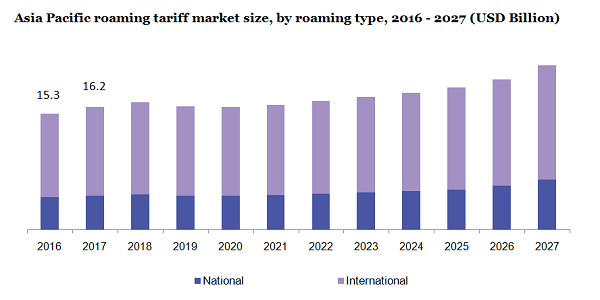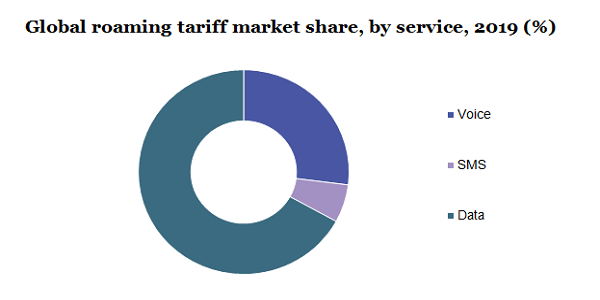- US: +1-408-610-2300
- Toll Free: +1-866-831-4085
- Become a Client
The global roaming tariff market size was accounted for USD 67.4 billion in 2019. It is projected to grow at a CAGR of 4.5% over the forecast period, 2020 to 2027. The Telecom sector is considered a key industry specifically in the ongoing coronavirus crisis. People are staying at home to stay away from this disease, which has impacted the telecommunication network with high traffic volume. To ensure uninterrupted connectivity, the government authorities, network operators, and content partners are engaging in creating awareness among consumers regarding using mobile networks wisely.

In addition, increasing penetration of the internet and mobile network is projected to boost the market growth. Moreover, the growing adoption of 4G network services is also expected to foster market growth. For instance, in 2018, according to international telecommunication unions, around 80.9% population in the world has access to the internet.
Furthermore, a continuous rise in the number of mobile subscribers is expected to support market growth. In 2017, according to the GSM Association, there were 5.0 billion unique mobile subscribers in the global market. Moreover, the growing trend of 5G services that offer high-speed connectivity is poised to play a crucial role in the growth of the telecommunication industry.
International Trade Center (ITC) states that international tourism constitutes 30.0% of total trade services. For example, when an individual travels from one country to another roaming charges are applied from the service provider, which benefits mobile network provider companies.
However, growing government regulations regarding telecom networks have lowered the roaming tariffs' profit margins. In addition, advanced network service providers need heavy investment, which may restrain the market growth.
Based on roaming types, the roaming tariff market is fragmented into international and national roaming. In 2019, the international roaming type segment led the market with a share of over 77.28% in the overall market. The companies offer tariff plans and travel sim cards for travelers and tourists. Although from the last few months, owing to the COVID-19 pandemic, the international tourism sector is expected to witness a decline in their sales. To avoid the spread of coronavirus the countries have imposed mandatory lockdowns. Whenever the situation is controlled the market is projected to regain its position.
The national roaming segment is projected to register a CAGR of over 2.0% from 2020 to 2027. Due to stiff government guidelines, this segment is anticipated to have substantial growth in the next few years. For example, the Telecom regulatory authority of India (TRAI) has levied a specialized tariff plan in the country with free incoming calls for users in the national roaming network.
In 2019, wholesale-type roaming held the largest market share of more than 73.0% in the overall market. This growth was boosted by the rising international tourism sector. In 2016, inbound tourism in Europe & North America is growing by over 60.0% and 87.0% respectively.
The retail roaming type segment is anticipated to propel at a CAGR of over 3.0% during the forecasted period. This growth is attributed to the increasing penetration of 4G and 3G services coupled with the rising number of mobile users.
The services segment is comprised of SMS, voice, data type services. In 2019, the data services segment dominated the market with the highest share of over 66.76% in the overall market. This growth is contributed to the rising demand for high feature smartphones, which is projected to drive the need for data services in roaming. In addition, due to the current COVID-19 crisis, people are staying at home and opting for working from home. This trend is projected to support the growth of data services.
 Voice segment is anticipated to propel at a significant rate of CAGR from 2020 to 2027. The increasing consumer preference for making calls during traveling abroad. SMS segment is anticipated to grow substantial rate owing to its high convenience & easy service.
Voice segment is anticipated to propel at a significant rate of CAGR from 2020 to 2027. The increasing consumer preference for making calls during traveling abroad. SMS segment is anticipated to grow substantial rate owing to its high convenience & easy service.
In 2019, Europe held the market with the highest market share of over 42.19% in the overall market. The European Commission has launched a service called roam at home to cut down on added roaming charges. With this policy, travelers across Europe will only have to pay regional SMS, data service charges.
Asia Pacific region is projected to grow at the fastest CAGR of around 5.0% over the forecasted period. In the countries such as India, the consumer has to pay roaming charges while traveling from one state or region to another, even with the same service provider. This is expected to proliferate the growth of the market.
The COVID-19 pandemic has negatively impacted the global roaming tariff market. Amid pandemic, governments across the globe have imposed lockdown. The people are staying at home and working from home. With the lockdown restriction, international travel has been banned. Thus, several telecom operators are suffering from loss of roaming revenues along with both mobile voice and data services.
In Europe, roaming tariffs are reduced to home levels based on country usage. The roaming revenues from people traveling to European countries are at average with about 6.0% of telecom operator revenue. However, the market is expected to grow at a rapid pace once the lockdown restriction eases down
The industry is highly competitive in nature, with the presence of global & domestic players. Key players in the market focus on strategic initiatives like acquisitions & mergers. For example, in 2018, Idea Cellular has merged with Vodafone Group. This strategy is projected to expand their consumer base.
Similarly, in 2019, Telefonica Moviles Guatemala was acquired by America Movil. This acquisition is aimed at expanding the company’s business across Guatemala, and Salvador. Key players in the roaming tariff industry include:
|
Attribute |
Details |
|
The market size value in 2020 |
USD 65.1 billion |
|
The revenue forecast in 2027 |
USD 88.9 billion |
|
Growth Rate |
CAGR of 4.5% from 2020 to 2027 |
|
The base year for estimation |
2019 |
|
Actual estimates/Historical data |
2016 - 2018 |
|
Forecast period |
2020 - 2027 |
|
Quantitative Units |
Revenue in USD Million & CAGR from 2020 to 2027 |
|
Report coverage |
Revenue forecast, company ranking, competitive landscape, growth factors, and trends |
|
Segments covered |
Roaming type, distribution channel, service, region |
|
Regional scope |
North America, Europe, Asia Pacific, Latin America & Middle East & Africa |
|
Country scope |
U.S., Canada, Mexico, Germany, U.K., France, China, India, Japan, and Brazil. |
|
Key companies profiled
|
America Movil; AT&T Inc.; Bharti Airtel Ltd; China Mobile Ltd.; Deutsche Telekom AG; Digicel Group; Sprint Corporation; Telefonica SA; Verizon communications Inc.; Vodafone Group plc |
|
15% free customization scope (equivalent to 5 analyst working days) |
If you need specific information, which is not currently within the scope of the report, we will provide it to you as a part of the customization |
This report forecasts revenue growth at global, regional, and country levels and provides an analysis of the latest industry trends and opportunities in each of the sub-segments from 2015 to 2025. For the purpose of this study, Million Insights has segmented the global roaming tariff market report on the basis of roaming type, distribution channel, service, and region:
• Roaming Type Outlook (Revenue, USD Million, 2016 - 2027)
• National
• International
• Others
• Distribution Channel Outlook (Revenue, USD Million, 2016 - 2027)
• Retail
• Wholesale
• Service Outlook (Revenue, USD Million, 2016 - 2027)
• Voice
• SMS
• Data
• Regional Outlook (Revenue, USD Million, 2016 - 2027)
• North America
• U.S.
• Canada
• Europe
• U.K.
• France
• Germany
• the Asia Pacific
• China
• India
• Japan
• Latin America
• Brazil
• Mexico
• Middle East &Africa (MEA)


Research Support Specialist, USA